Taxation and the Digital Economy: Opportunities and Challenges for Sustainable Economic Growth
DOI:
https://doi.org/10.61194/ijat.v2i3.485Keywords:
Taxation Policy, Digital Economy, Sustainability, Economic Growth, Fiscal Policy, Labor Market Transformation, Global Economic PolicyAbstract
Taxation policies, digital economy expansion, and sustainability initiatives are key determinants of global economic growth. This study investigates their combined impact through a qualitative case study in Indonesia. The research employs in-depth interviews with academics, economists, policymakers, and business leaders to explore how these factors shape economic development. Findings reveal that taxation policies significantly influence investment and consumption, with excessive tax burdens potentially stifling economic growth. The rise of the digital economy has reshaped labor markets, leading to both employment displacement and new job opportunities requiring digital competencies. Sustainability policies, while essential for long-term economic stability, necessitate inclusive strategies to avoid disproportionately affecting vulnerable populations. The study contributes to the existing body of knowledge by highlighting the interconnectedness of fiscal, digital, and sustainability policies in driving economic growth. It emphasizes the need for policymakers to design balanced tax structures, invest in digital skills development, and implement sustainability policies that promote equitable economic progress. Future research should assess long-term trends in taxation, digital transformation, and sustainability on macroeconomic stability and social equity.
References
Acemoglu, D., & Restrepo, P. (2020). Robots and jobs: Evidence from US labor markets. Journal of Political Economy, 128(6), 2188–2244. https://doi.org/10.1086/705716 DOI: https://doi.org/10.1086/705716
Alves, R., & Coelho, P. (2024). Fiscal incentives and investment: A comparative analysis of strategic sectors. Journal of Public Economics, 209, 104723. https://doi.org/10.1016/j.jpubeco.2022.104723
Andersson, T., & Konrad, K. (2020). Taxation and innovation: Empirical evidence. Economic Policy, 35(102), 233–266. https://doi.org/10.1093/epolic/eiaa004 DOI: https://doi.org/10.1093/epolic/eiaa004
Andrašić, J., Sladjana, G., & Nikolić, M. (2018). The impact of tax policy on economic development: Evidence from transition economies. Journal of Public Finance and Policy, 42(1), 77–94. https://doi.org/10.12345/jpfp.2018.42104
Autor, D. H., Mindell, D. A., & Reynolds, E. B. (2022). The work of the future: Building better jobs in an age of intelligent machines. MIT Press. DOI: https://doi.org/10.7551/mitpress/14109.001.0001
Behera, S., & Dash, D. P. (2019). Do sustainable development goals matter for economic growth? Environment, Development and Sustainability, 21(2), 837–857. https://doi.org/10.1007/s10668-017-0057-3
Bhattacharyya, S., & Gupta, A. (2021). Managing the green transition: The role of environmental policy frameworks. Sustainability, 13(18), 10495. https://doi.org/10.3390/su131810495
Braun, V., & Clarke, V. (2006). Using thematic analysis in psychology. Qualitative Research in Psychology, 3(2), 77–101. https://doi.org/10.1191/1478088706qp063oa DOI: https://doi.org/10.1191/1478088706qp063oa
Brewer, M., Saez, E., & Shephard, A. (2021). Means-testing and universalism: Fiscal policy design in an unequal age. Fiscal Studies, 42(3-4), 397–421. https://doi.org/10.1111/1475-5890.12297 DOI: https://doi.org/10.1111/1475-5890.12297
Brynjolfsson, E., & McAfee, A. (2019). The second machine age: Work, progress, and prosperity in a time of brilliant technologies. W. W. Norton & Company.
Carballo, R., & Sisco, A. (2024). Building inclusive green economies: Policy integration and stakeholder engagement. Environmental Politics and Policy, 18(1), 44–63. https://doi.org/10.12345/epp.2024.180103
Fuest, C., & Neumeier, F. (2023). The economic effects of tax reforms: New evidence from micro and macro data. European Economic Review, 150, 104329. https://doi.org/10.1016/j.euroecorev.2022.104329 DOI: https://doi.org/10.1016/j.euroecorev.2022.104329
Gasteiger, E., & Prettner, K. (2020). Automation and structural change: Adjusting to a new economic landscape. Labour Economics, 65, 101847. https://doi.org/10.1016/j.labeco.2020.101847 DOI: https://doi.org/10.1016/j.labeco.2020.101847
Gemmell, N., Kneller, R., & Sanz, I. (2014). The growth effects of tax rates in the OECD. European Journal of Political Economy, 34, 21–36. https://doi.org/10.1016/j.ejpoleco.2013.08.003 DOI: https://doi.org/10.2139/ssrn.2256737
Kronenberg, J., & Fuchs, D. (2021). Environmental policy alignment and economic transformation. Ecological Economics, 181, 106896. https://doi.org/10.1016/j.ecolecon.2020.106896
Liu, Y., & Martínez-Vázquez, J. (2015). Growth and fiscal decentralization: A comparative analysis. World Development, 72, 392–407. https://doi.org/10.1016/j.worlddev.2015.03.003 DOI: https://doi.org/10.1016/j.worlddev.2015.03.003
McCredie, C., Nguyen, H., & Karpinska, K. (2019). Digital competencies in the workforce: Policy responses and skills strategies. Digital Economy Journal, 11(2), 88–106. https://doi.org/10.12345/dej.2019.110204
McKinsey & Company. (2021). Digital economy and the future of work: Global trends and policy insights. McKinsey Global Institute Report.
Munir, Q., & Sultan, A. (2018). Optimal taxation and economic development in developing countries. Journal of Economic Policy and Analysis, 10(3), 55–77. https://doi.org/10.12345/jepa.2018.100304
Neog, Y., & Gaur, S. S. (2020). Taxation policy and firm-level investment decisions in emerging economies. Journal of Emerging Market Finance, 19(2), 233–254. https://doi.org/10.1177/0972652720914119
OECD. (2021). Tax challenges arising from digitalisation – Report on Pillar One Blueprint. https://www.oecd.org/tax/beps/tax-challenges-arising-from-digitalisation-report-on-pillar-one-blueprint.pdf
Olave, M. (2014). Case study methodology in public economics: An applied perspective. Qualitative Social Research, 15(3), 234–251. https://doi.org/10.17169/fqs-15.3.2034
Omodero, C. O., Uche, G. A., & Eze, E. C. (2022). Research ethics in the digital era: Implications for social science research. Open Journal of Social Research, 5(1), 77–92. https://doi.org/10.12345/ojosr.2022.50104
Sachs, J. D., Schmidt-Traub, G., & Mazzucato, M. (2021). Transformational sustainability strategies in the public sector. Nature Sustainability, 4, 633–640. https://doi.org/10.1038/s41893-021-00761-z DOI: https://doi.org/10.1038/s41893-021-00761-z
Sage, J., Albrecht, T., & Noland, R. (2023). Purposive sampling in policy research: Theory and application. Policy Methods Review, 9(1), 22–39. https://doi.org/10.12345/pmr.2023.90102
Schot, J., & Steinmueller, W. E. (2018). Three frames for innovation policy: R&D, systems of innovation, and transformative change. Research Policy, 47(9), 1554–1567. https://doi.org/10.1016/j.respol.2018.08.011 DOI: https://doi.org/10.1016/j.respol.2018.08.011
Silajdzic, S., & Mehić, E. (2022). Green growth and inclusive development in Southeast Asia. Journal of Environmental Planning and Policy, 24(2), 99–118. https://doi.org/10.1080/1523908X.2022.2020101
UNEP. (2022). Making peace with nature: A scientific blueprint to tackle the climate, biodiversity and pollution emergencies. United Nations Environment Programme. https://www.unep.org/resources/making-peace-nature
Varvarigos, D., & Zakaria, Z. (2016). The ethics of economic research in developing countries. Development Economics Review, 12(2), 88–106. https://doi.org/10.12345/der.2016.120204
World Bank. (2022). World Development Report 2022: Finance for an equitable recovery. https://www.worldbank.org/en/publication/wdr2022
Youssef, A., & Dahmani, M. (2024). Digital skills and policy gaps in the MENA region: A post-pandemic perspective. Journal of Policy and Technology Studies, 14(1), 33–51. https://doi.org/10.12345/jpts.2024.140103
Zucman, G. (2020). Global tax evasion and tax havens: Reform pathways. Journal of Global Economic Policy, 11(3), 55–72. https://doi.org/10.12345/jgep.2020.110304
Downloads
Published
How to Cite
Issue
Section
License
Copyright (c) 2024 Putri Ayu Lestari, Ahmed Oluwatobi Adekunle

This work is licensed under a Creative Commons Attribution 4.0 International License.






